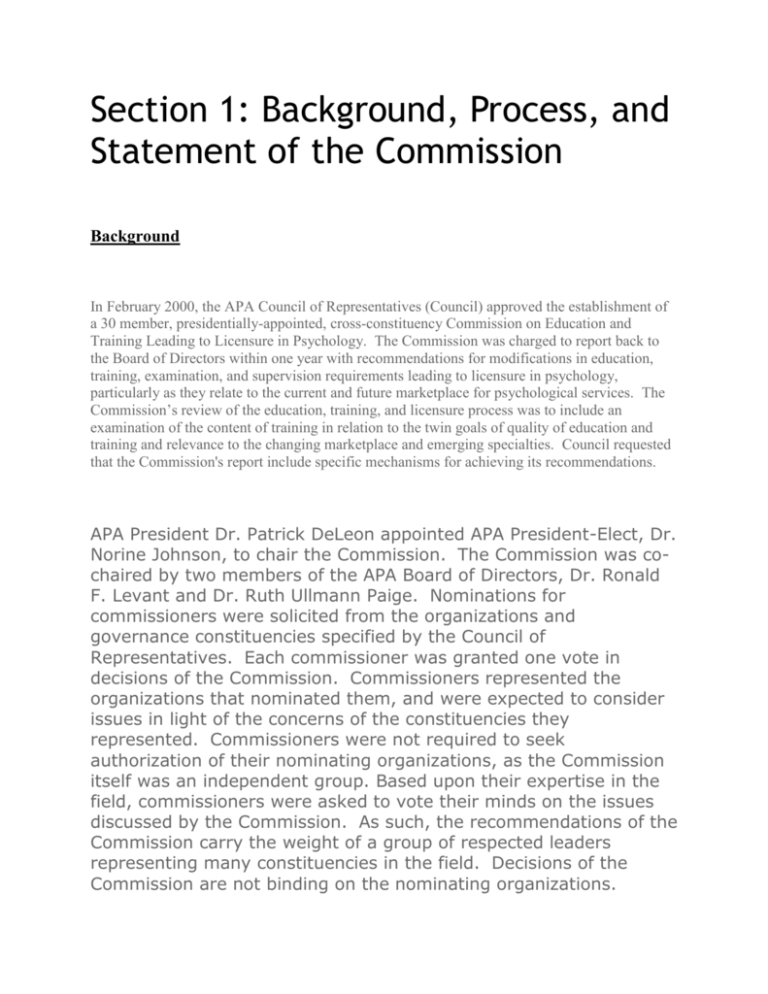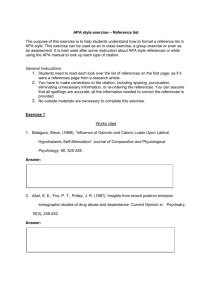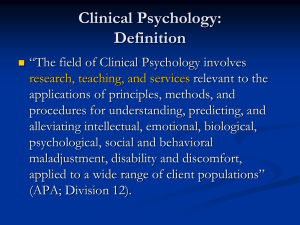The Commission on Education and Training Leading to Licensure in
advertisement

Section 1: Background, Process, and Statement of the Commission Background In February 2000, the APA Council of Representatives (Council) approved the establishment of a 30 member, presidentially-appointed, cross-constituency Commission on Education and Training Leading to Licensure in Psychology. The Commission was charged to report back to the Board of Directors within one year with recommendations for modifications in education, training, examination, and supervision requirements leading to licensure in psychology, particularly as they relate to the current and future marketplace for psychological services. The Commission’s review of the education, training, and licensure process was to include an examination of the content of training in relation to the twin goals of quality of education and training and relevance to the changing marketplace and emerging specialties. Council requested that the Commission's report include specific mechanisms for achieving its recommendations. APA President Dr. Patrick DeLeon appointed APA President-Elect, Dr. Norine Johnson, to chair the Commission. The Commission was cochaired by two members of the APA Board of Directors, Dr. Ronald F. Levant and Dr. Ruth Ullmann Paige. Nominations for commissioners were solicited from the organizations and governance constituencies specified by the Council of Representatives. Each commissioner was granted one vote in decisions of the Commission. Commissioners represented the organizations that nominated them, and were expected to consider issues in light of the concerns of the constituencies they represented. Commissioners were not required to seek authorization of their nominating organizations, as the Commission itself was an independent group. Based upon their expertise in the field, commissioners were asked to vote their minds on the issues discussed by the Commission. As such, the recommendations of the Commission carry the weight of a group of respected leaders representing many constituencies in the field. Decisions of the Commission are not binding on the nominating organizations. Meetings of the Commission were held May 19-21 and September 8-10, 2000. A list of organizations and constituencies represented on the Commission and the names of their commissioner(s) and liaison(s) is attached as Appendix 1. The Commission was charged with reviewing the current state of education and training in professional psychology for the purpose of determining at what point basic readiness for independent practice is achieved. Given that licensure is intended to be a proxy for this basic readiness to practice, the Commission used as a starting point for discussion theModel Act for State Licensure of Psychologists (Model Act), the current APA policy that provides recommendations regarding education and training leading to licensure. The Commission was aware that its recommendations were intended to inform policymakers and that only the APA Council of Representatives can make changes to APA policy. The Commission asserted that professional training, whether at the practicum, internship, or postdoctoral level, needs to be organized, sequential, and well supervised with ongoing evaluation of competence in a breadth of professional areas. The Commission’s review of the current state of education and training in professional psychology highlighted the changes in predoctoral supervised professional training that have occurred over the last fifty years, and especially within the past decade. The Commission specifically and explicitly stated that two years of organized, sequential, supervised, professional training experience (in addition to completion of the doctorate) is necessary and sufficient for entry-level professional practice. The Commission affirmed a one-year, formal, predoctoral internship as a necessary component in the sequence of education and training, and recommended that this be added as an explicit aspect of APA policies regarding licensure. Students currently receive a substantially increased amount of supervised professional training in practica prior to internship. Provided that this pre-internship practicum experience is organized, sequential, and well supervised, the Commission believed that this experience met the need for a second year of training in addition to the internship. However, the additional year could also be obtained after the predoctoral internship and the granting of the degree, through postdoctoral experience. Thus, the Commission did not recommend decreasing supervised experience for licensure, but rather recommended increased flexibility in the timing of these experiences. The Commission believed that this flexibility would strengthen the profession by better matching current training models and also by encouraging accountability among training programs for providing organized and sequential training, regardless of whether it is predoctoral or postdoctoral. The Commission was committed to the importance of APA accreditation of both doctoral and internship programs, yet wanted to ensure that opportunities remain available for new and innovative programs to develop as well as for postdoctoral respecialization. The Commission concluded that current training of many doctoral psychologists provides them with sufficient experience to be competent for entry-level practice upon completion of the internship and doctoral degree (when they have completed two years of organized, sequential, supervised professional training experience predoctorally). At the same time, the Commission explicitly and strongly wished to affirm the value of organized, sequential, supervised postdoctoral experiences for those who wish to receive further training. Obviously, psychologists who do not receive two years of such training predoctorally should have the option of receiving it postdoctorally. In addition, for those psychologists who have received two years of training predoctorally, the Commission saw organized postdoctoral training programs, postdoctoral consultation, and postdoctoral supervision as an important mechanism for the development of advanced competency and expertise for professional practice. The Commission was aware that implementing changes in APA policy and in licensing laws and regulations would require significant commitment of time and both human and financial capital and a significant shared commitment among the various communities within organized psychology. The Commission was further aware that changes in APA policy do not automatically translate into changes in legislation and regulation. Further, decisions about implementation and the impact of efforts to implement policy changes will need to be considered in the context of legislative priorities in a given state, but also in the context of other priorities and initiatives underway within organized psychology. Process At the end of its first meeting, the Commission voted on a draft statement that proposed altering the education and training recommendations for licensure in the Model Act. Between meetings, commissioners reviewed the draft statement carefully with their constituency groups, and through a series of working groups, outlined its implications for each stage of the education and training process. An Implementation Working Group focused solely on the legal and political challenges of implementing the draft statement recommendations in actual state licensure acts. Commissioners reviewed the implications of the draft statement compiled by the working groups during the second meeting of the Commission. Discussion of these implications led to revision of the Commission’s statement. The Commission voted and approved the statement below. A second series of working groups convened to develop recommendations and implementation strategies for each constituency group that would be responsible for implementing various recommendations. These recommendations and strategies are presented in Section 2. Please note that the commissioners felt strongly that the recommendations in Section 2 are interdependent. They did not feel that APA policy could simply be changed without parallel supporting action as outlined in the recommendations. The Implementation Working Group reconvened to develop a list of implementation issues and implications that should be considered if APA contemplates a policy change. These issues and implications are presented in Section 3. Statement of the Commission The Commission on Education and Training Leading to Licensure in Psychology recommends that psychologists be eligible to sit for licensure upon completion of the following education and training: 1. A doctoral degree from an APA- or CPA-accredited program in psychology.[1] Where accreditation in the program’s substantive area is not available, the program will be required to be designated as a doctoral program in psychology by the Association of State and Provincial Psychology Boards or the National Register of Health Providers in Psychology. 2. The equivalent of two years of organized, sequential, supervised professional experience, one year of which is an APA- or CPAaccredited predoctoral internship, or one that meets APPIC membership criteria, or, for school psychologists, a predoctoral internship based in a school setting which meets CDSPP Doctoral Level Internship Guidelines.[2] The other year of experience also may be completed prior to receiving the doctoral degree. An aspect of this training is the ongoing assessment of competence in a breadth of professional areas. Postdoctoral education and training is an important part of the continuing professional development and credentialing process for professional psychologists. Section 2: Commission Recommendations Recommendation Strategy for Implementation Major Implementation Groups I. Policy Change A) APA adopt as policy the Commission recommendation that psychology graduates be eligible to sit for licensure as specified in the statement approved by the Commission A) Forward item to APA Council A) APA Council of of Representatives Representatives B) APA to pursue changes in state licensing laws when appropriate B) Work with relevant groups B) APA Council of Representatives, State Psychological Associations, ASPPB, Constituencies represented on the Commission, state licensing boards C) Define competencies (e.g., research, practice, human diversity, etc.) expected of graduates of doctoral programs in professional psychology over the next decade and design developmentally-informed education and training guidelines for their achievement and assessment, to include: C) Working conference, following preliminary work by CCTC to develop information for pre-conference reading C) APA (BEA, BPA/CAPP, BSA, BAPPI, COA, APAGS) in collaboration with COGDOP, APPIC, CCTC[3], APAGS, and other relevant education, training, and practice groups ci) guidelines on practicum training related to definitions and minimum requirements (including the possibility of a cap), quality of training sites and supervision, curriculum and competency objectives at different stages of training, trainee performance assessment, and relationship between doctoral program and practicum sites; and, ci) analyze information available on competencies from accredited doctoral and internship programs and national groups representing professional psychology education cii) guidelines for communication between graduate programs and cii) draft guidelines for communications between internship sites related to articulation graduate programs and internship of student competencies expected of sites, with input from relevant each by the other, the assessment of education and training groups those competencies prior to, during, and at the end of internship training, and working with problem students. D) APA to recommend that CoA reexamine and consider revising Domain B (Program Philosophy, Objectives, and Training Plan) of the Accreditation Guidelines and Principles with regard to competency objectives, curriculum plan, and guidelines for practicum and internship training. D) Integrate outcomes of working conference on professional psychology competencies and training guidelines as appropriate to the principles of accreditation and the USDE and CHEA provisions for recognition. D) COA in consultation with constituencies affected by accreditation and with CPA Accreditation Panel. E) APA to recommend that ASPPB reexamine and consider policy on the timing of the EPPP national examination for licensure in psychology to assure appropriate timeliness of administration in the sequence of doctoral education and training. E) Analyze costs and benefits of offering exam prior to completion of doctoral degree E) ASPPB, State Psychology Boards, CCTC members, COGDOP, APAGS, ASPPB, Professional Examining Service, and APA (BEA, BSA, BPA/CAPP, BAPPI) F) Establish an infrastructure to support a national forum on issues of education and their link to the future of our discipline and profession. This forum would provide a venue to convene the leaders of the education constituencies and advance an ongoing dialogue among academic leaders in psychology regarding critical issues of change in education, our discipline, and our society relevant to the teaching of psychology and preparing the next generation of psychologists. F) Annual education leadership conference to serve as a forum for discussion of critical issues among educators, including participants representing national associations outside psychology, and between psychology educators and others of the discipline representing psychological science, practice, and public interest communities. F) All education, training, and credentialing organizations in psychology; APAGS; various constituencies representing the outcomes of education and training as determined by employment settings; relevant APA groups (BEA, BSA, BPA/CAPP, BAPPI, and divisions); state psychological associations; and psychologists in executive academic leadership roles. G) Build support for practice community 'buy-in' to the proposed policy changes on education and training for entry level practice and build support for education community 'buy-in' of existing G1) Develop educational materials on the Commission proposals and how they benefit professional psychology and enhance the existing priorities of the practice community. G) BEA, BPA, and CAPP in consultation with other groups represented on the Commission practice advocacy initiatives and to partner with practice advocacy on licensure change initiatives. G2) Develop a coordinating committee of BEA/CAPP/BPA to lead effort H) Develop ongoing mechanisms for future conversations and priority discussions between practice and education constituencies to work towards integration of practice and education initiatives and achieving consensus on priorities with regard to advocacy for professional education and training in relation to career development and market place needs for practitioners. H) BEA/CAPP/BPA coordinating committee to hold annual meeting of representatives of education and practice communities for discussion of (preceding) materials on professional education and practice issues. H) BEA, BPA, and CAPP with participation of state psychological associations, state licensing boards, and other education, training, and practice organizations. I) Enhance education advocacy efforts to augment and support practice advocacy in areas of mutual interest, such as changes in state licensing laws. I) Develop education advocacy networks and coordinators to complement state and national level advocacy networks in practice I) PPO (Education) in consultation with BEA and its constituent communities, and with practice advocacy community. J) Develop an information system for prospective students and others of the public on outcomes of professional education and training, to include information on program goals and professional competencies for which training is offered, information on program admissions, attrition, time to degree, student debt, internship placements, licensure outcomes of graduates (and reference to public information on licensure requirements by jurisdiction), and job placement following graduation. J) Expand information available to public through 'Grad Study' and other media on graduate program outcomes information and mechanisms used by programs to certify the readiness of their graduates for independent practice. J) APA Offices of Program Consultation and Accreditation, Graduate Education and Training, Publications and Communications in consultation with COGDOP, CCTC, COA, and APAGS. Section 3: Implementation Elements The proposed policy changes from the Commission are destined to remain historical artifacts unless issues of implementation are seriously addressed. The Implementation Working Group of the Commission believes that for APA to entertain the possibility of movement from proposed policy to large-scale implementation of psychology license statutory change, it must, by definition, agree to address the changes outlined in this report. In addition this will require major financial, intellectual and personnel resources of the APA. Moreover, this will not be enough in and of itself, and must also coincide with similar priority setting and resource commitment by groups outside of APA such as State and Provincial Psychological Associations (SPPAs), educational institutions, the COA, state Political Action Committees (PACs), and the Association of State and Provincial Psychology Boards (ASPPB). This section outlines the issues needing attention as well as a preliminary template for organizing the necessary support, data, money and advocacy to move from policy to implementation through licensing law and regulatory change and accreditation standards modification. We recognize that the requirements outlined below may seem daunting. However, please bear in mind that changes of this nature while they have been daunting, have been achieved in the past and can be achieved in the future if it is clearly determined to be in the best interests of the profession. There are both internal and external constituencies that will be affected by implementation of the commission recommendations. Those constituencies internal to APA include the: APA Board of Directors APA Council of Representatives BEA and its related committees BAPPI and its related committees CAPP and BPA and related committees The Committee of State Leaders APAGS Divisions Other APA Committees External entities that will be affected include: State and Provincial Psychological Associations Departments of psychology at universities and professional schools Internship and post doctoral programs Committee on Accreditation Credentialing and accrediting groups State and Provincial licensing boards ASPPB Legislative, regulatory, and other governmental bodies The Rationale APA needs to craft the case for policy change in a clear, comprehensive, and convincing way for the various constituencies to fully understand the impact of their vote. To change policy without emphasizing the dependence on changing statutory requirements for psychology licensure may leave future psychologists out of compliance with licensure requirements, since this is regulated by state/provincial law. To plan to change state/provincial law will require an appreciation for the complexities of these processes as well as an understanding of how this new policy initiative could negatively impact current psychology policy priorities that are in place at this time. These complexities must be explained, the alternatives must be demonstrated to be inadequate in addressing the problems, and those voting must be willing to allow for changes in theexisting professional psychology priorities. The following partial list of issues should be considered in decision-making. State Legislation/Regulation Most states/provinces need to change licensing law to accommodate change to two-year predoctoral experience requirement Some states can change through regulation but this is also a political/advocacy process Change will be costly (see funding) There needs to be general psychologist and SPPA board buy-in that this is a priority for the state legislative agenda There is always risk of unintended and unwanted language being inserted into psychology licensing law as well as more substantive reorganization when licensing laws are “opened up” for legislative changes . Potential State Legislation Conflicts Master’s level issue – what could be seen (and would be described by other professions with their own agendas) as downgrading of psychology requirements would conflict with attempts to contain the statutory scope of practice of groups trained at the master’s level and helps discriminate psychology from other “psychotherapy” providers Prescriptive authority legislation attempts to broaden and increase the scope of practice for psychologists while the proposed APA policy change could be seen (and would be described by our opponents) as decreasing psychologists’ training Some states have just completed legislative efforts to comply with the current model psychology act in terms of postdoctoral experience requirements and report that they do not feel that they could “come back to the well” (the legislature) again for years Some states are in a constant battle to retain the uniqueness of their psychology board from the threat of being subsumed under an omnibus board of licensed mental health or health professions Mobility efforts at the state/provincial level would be impacted by any perceived dilution of licensing standards Any effort to implement the new APA policy would need careful crafting of arguments and rebuttals and would probably need to be done in a sequenced and spaced approach ASPPB and licensing boards will have to be convinced that this change will not in any way have a negative impact on the consumer State Priorities Any new initiative needs to be considered within the list of other legislative priorities determined by the Board of Directors of the SPPA Some states have legislative priorities laid out for years in advance, and few have planned to work on this policy change at this point in time Some SPPA priority setting is controlled by the SPPA and some is not (e.g. outside groups filing bills antithetical to the needs of psychologists require legislative resources from the association) Priority setting depends on the political climate within the state. A bill might be ready to go but wait years for a favorable political landscape. SPPAs must take the lead role in coordinating the decision of when and how to file a bill. Funding This policy change will be expensive and should not be seen as only a practice issue. Since practitioners comprise a good part of the membership of the SPPAs, APA-wide acceptance of the issue and APA funding will be needed. This change must also be seen as an APA priority since political contributions to state PACs are lowest from the constituencies which most desire this change, e.g. students, educators, internship directors, etc. Thus, funding will need to be association-wide and will need to address the issues below, among others. more funds will be needed at the state association level, particularly for small/rural states treasurer of APA, CFO will need to develop cost estimates consider academic resources available increasing SPPA membership will increase the financial base through dues states will need to work with their PACs use of university lobbyists will be an added resource earmark Education Directorate funds to train key faculty at state universities in advocacy Rural and Special Populations Some small and rural states need outside financial help just to maintain part-time executive directors, so additional funding for legislative initiatives is necessary. Some rural states have few or no APA-accredited training programs and internship sites. There is currently a necessary economy of scale which must be met for it to be feasible for a program to apply for APA accreditation, so if this is to be the norm, some accommodations need to be met to deal with this issue. Concern was expressed that if APA program accreditation is required, support will be lost from the schools who now train psychologists but feel they are too small or under-funded to apply for accreditation. In addition, expecting legislative changes to eliminate licensure ofgraduates from schools in a state that is too small to support an APA- or CPA- accredited program will never happen. In addition, some legislatures are not willing to endorse professional association accreditation as education or training standards for licensure but, instead, adhere to other accrediting entities. Some internships geared to special populations, especially those representing ethnic, cultural, and other minority groups, provide an important service but may not have economy of scale factors for accreditation purposes. Part-time internships need to be allowed to accommodate legitimate personal, family, and financial reasons. Internship Issues Some areas of the country have fewer internship slots than students seeking internships. Some students cannot leave or choose not to leave their geographical area to train. The system of matching students to internship sites and the impact on licensure needs to be addressed, especially if the impact of not finding an appropriate internship is failure to achieve licensure. More information identifying students and their educational programs is needed to determine if additional internship training sites are required. Currently students can get licensed without accredited internships but if this criterion is required, the stakes become higher to get one and so will the competition. See above for special issues of rural and diverse areas and populations. Specialties such as school psychology and IO have not developed extensive APA internships. Since these systems are not primarily healthcare, the necessary work and expense may not be a priority for them and they may even be opposed to a policy change. There needs to be an alternative or process to address licensure needs for these groups. Transition Issues Process of legislative and regulatory change could take 10-20 years or more. During the period of licensing law change, attention to educating students and faculty of the changing and differing requirements of each state would be necessary. Students would have to be informed about the possible need to complete three years of supervised experience (two predoctoral and one postdoctoral, under the old and the new system), if they were unsure of where they want to become licensed. In the foreseeable future, if relocation is desired, meeting the current standards for licensure would be necessary. Accreditation would need to address the needs of small or rural states and small services to insure that psychologists can continue to be trained in those localities to work with those special population groups. Accreditation would need to address a process such as provisional accreditation of programs and sites if they are starting up and if accreditation is required for licensure. In general, one positive aspect of this process is that this might be the time to step back and look at the whole accreditation process to see if it needs modification as well. Some states/provinces allow students to sit for the EPPP exam after completion of the doctorate. Students may be able to take the exam in those states and transfer their scores to the board in another state that does not allow them to sit for the exam until some months after completion of the postdoctoral year. This may cut up to six months off of the wait for some students. Working to make this option possible in all states could be explored. Also, beginning next year, the possibility to take the EPPP through computer administration at any time the student is eligible, should help alleviate the problem. Mobility Mobility between states with different licensure requirements needs to be addressed. Since 25 jurisdictions have agreed to accept the ASPPB Certificate of Qualification for individual mobility and since this requires a postdoctoral experience, the Commission recommendations will have a major impact on mobility. The Commission may have to decide on priorities, or work with ASPPB to accommodate the proposed policy changes.Attention and accommodation needs to be made for mobility of people licensed under the old/current criteria of the model act and to states who change their requirements as well as for people getting trained as systems evolve to a new model. Data Needs Data from the Education Directorate, Science Directorate and Public Interest Directorate will be needed to present a case about most or all of the representations we make in our arguments for the proposed changes. These data need to be compelling enough to sway groups of professionals such as licensing boards, educational institutions and our own APA boards. Data is needed in the following areas: Training, e.g. how many hours of predoctoral training are students currently doing? Is the increase in hours related to the competitiveness of the APA internships or some other factor? How many practicum hours do students complete now as compared to the past? Is there resistance to decreasing practicum hours? Are there stakeholders in maintaining the number of hours? Do APA (or CPA/ APPIC) internship sites produce psychologists better qualified and/or prepared for independent practice? How many programs and internship sites would be unable to meet the new criteria for training leading to licensure? How many states would be without programs or internships that would meet the proposed new licensure standards? Difficulties in acquiring postdoctoral supervision and the variability of quality must be documented. Is there any vehicle for improving postdoctoral training? Would new approaches to payment for postdoctoral training improve the quality of the supervised experience? Is there evidence that the postdoctoral experience is unnecessary for licensure readiness? Readiness for practice at journeyperson level must be demonstrated through treatment outcomes data and compared to similar data for other professional groups. Current increased predoctoral experience years need data to develop argument that there is more quality control over training if done under the auspices of the graduate departments. Data should show that the level of training prepares an individual for the scope of practice granted under licensure. Data need to be collected related to general and specific consumer protection issues such as, impact on training psychologists who represent diversity and who treat diverse populations, quality measures for treatment provided by psychologists trained under the new model, impact on rural states and populations in terms of programs acceptable under the new criteria, and access to psychologists in the future. Need data on the economic impact of the change to current system and reimbursement, student loan programs, training funding issues, and managed care reimbursement. Are there alternative methods to subsidize training programs and students that address the current specific problems in postdoctoral training as well as the length of training in general? What additional efforts could APA make to promote Federal initiatives in mental health care? Multiple other questions and challenges which might arise through the legislative process. How will insurance companies be affected – NCQA standards, Medicare and Medicaid, and other third party payers? Need estimate of time and materials that need to go into training of people that will sell this argument Does This Fix the Problem? – Additional SPPA Advocacy Needs One issue, which sparked the creation of the Commission, was the problem of third party reimbursement for psychology interns. This policy change does not specifically address that problem. Advocacy for state, federal, and third party reimbursement would need to continue and be coordinated with this effort. Advocacy may be made more difficult, particularly with third party payers, by what may be perceived as a reduction in training requirements, so the argument emphasizing “time shifting” not “training reduction” needs to be strongly crafted. To the extent that this is seen as a move to a more medical model of training, which it will be by some, attention needs to be paid to the issue of medical residencies as they relate to specialty care. The postdoctoral year has been used in this way for some people and models of further utilizing and organizing this process might be made. Academic Community Buy-In The education community must address the issue of buy-in of the academic departments to the proposed APA policy change, and moreover must convince them that for this to occur, it must be seen as a high priority. The argument made that regulation of the profession is improved by bringing the prelicensure training under the purview of the academic department must be supported by data, which need to be collected. To get buy-in for the recommendation that the graduate department will approve and monitor both of the required two years of experience, it is necessary to clarify this expectation and the responsibility this entails. We must make it clear that academic programs are not being asked to sign off that the student is competent to practice, but that the student has met the established criteria for the granting of the degree. This expectation will probably not work for the postdoctoral year, and should be reviewed by COLI. Educational institution faculty will need to be on-board with the policy change and the impetus for this buy-in needs to come from the educational community. Considerable statewide political/lobbying mechanisms within state universities will be needed. Therefore it will be imperative to obtain agreement to set our issue as a high priority and work with the SPPAs as the lead groups. Identify those who might disagree with policy within universities, and try to neutralize the opposition. Utilize the association of psychologists who work in medical schools for support. Work on development of student groups within state associations. Work with academic institutions to get their students and faculty in support of the change and trained in advocacy. Students and new professionals need to push their academic departments to get involved in this issue. Encourage APAGS to set this change as one of their top priorities. Selling the Proposal Meeting the data needs and processes outlined above must alternate with work to achieve buy-in and support from necessary constituencies to authorize the resources necessary. To gain this support, the following things need to happen: Clear materials need to be developed with content adjusted for internal and external marketing of the new policy. Data must be available for distribution. Internal constituencies must be convinced at the onset that the policy change is a solution to the problems and should consider it a high priority. All the data, goals and proposals must be concise and in place before moving to the external education and advocacy plans. Suggest that SPPAs reach out to their members and state educational institutions through their training committees, coordinating this effort with academic programs encouraging states to establish training committees, and reaching out to academic programs and internship sites. State associations need to use their coalition base (like in the parity coalition) to inform and address any opposition. APA must develop a coordinating mechanism for state associations as laws are being passed to coordinate the legislative activities. Order of Work 1. Develop cogent arguments for policy change, provide data to describe the current and projected training elements, and describe implementation needs 2. Internal buy-in plans and implementation 3. External buy-in plans and implementation 4. Further development of cogent arguments to address all of the potential implementation problems and arguments 5. Development of grass roots network – both state associations and academic programs 6. Enlist other supporters, such as parents of students and internship sites (a move to anational standard of program hours should lead to better quality and uniformity) 7. Identify potential opponents, such as schools and internships that will be eliminated, get data on who they are, and try to generate alternatives and neutralize opposition COMMISSION ON EDUCATION AND TRAINING LEADING TO PSYCHOLOGY Chair: Co-chairs: Norine G. Johnson, PhD Ronald F. Levant, EdD Ruth Ullmann Paige, PhD Commissioners-at-Large: Justin McDonald, PhD Kathleen McNamara, PhD American Psychological Association of Graduate Students Commissioners: Carol Williams (May) Marcus Patterson (September) Liaison: Diana Salvador, M.S. APAGS Task Force on New Professionals Commissioner: Corey Habben, PsyD Association of Counseling Center Training Agencies Commissioner: Joyce Illfelder-Kaye, PhD Liaison: Jennifer Erickson Cornish, PhD Association of Psychology Postdoctoral and Internship Centers Commissioners: Emil Rodolfa, PhD (May) Nadine Kaslow, PhD (September) Liaison: Emil Rodolfa, PhD (September) Association of State and Provincial Psychology Boards Commissioner: Asher R. Pacht, PhD Board for the Advancement of Psychology in the Public Interest Commissioner: Jessica Henderson Daniel, PhD Board of Educational Affairs Commissioners: Virginia A. Mathie, PhD (May) Robert G. Frank, PhD (September) Board of Professional Affairs Commissioners: Toy Caldwell-Colbert, PhD (May) Suzanne Bennett Johnson (September) Board of Scientific Affairs Commissioner: Christopher Peterson, PhD Caucus of State and Provincial Representatives Commissioner: Barry Anton, PhD Committee of State Leaders Commissioner: Anne Cowardin-Bach, PhD Committee on Accreditation Commissioners: Thomas Jackson, PhD (May) Susan D. Phillips, PhD (September) Liaison: Elizabeth Davis-Russell, EdD, PhD Council of Chairs of Training Councils Commissioner: Beverly Thorn, PhD Council of Counseling Psychology Training Programs Commissioner: Rodney K. Goodyear, PhD Council of Credentialing Organizations in Professional Psychology Commissioner: Judy E. Hall, PhD Council of Directors of School Psychology Programs Commissioner: Stephen T. DeMers, EdD Council of Executives of State and Provincial Psychological Associations Commissioner: Elena Eisman, EdD Liaison: Sally R. Cameron Council of Graduate Department Chairs in Psychology Commissioner: David Scott Hargrove, PhD Liaison: Florence L. Denmark, PhD Council of Health Psychology Training Programs Commissioner: Gary Geffken, PhD Council of Specialties in Professional Psychology Commissioner: Neil S. Grossman, PhD Council of University Directors of Clinical Psychology Programs Commissioner: Daniel W. McNeil, PhD Department of Veterans Affairs Commissioner: Robert C. Gresen, PhD Liaison: Peggy J. Cantrell, PhD National Council of Schools and Programs of Professional Psychology Commissioner: Joseph W. Bascuas, PhD Liaison: Kathi Borden, PhD Society for Industrial and Organizational Psychology Commissioner: Richard M. Klimoski, PhD Additional Liaisons Presidential Appointee: Kathleen Brown, PhD Division 35: Mary Brabeck, PhD APA Board of Directors: George P. Taylor, PhD (May) (September) APA Staff Cynthia Belar, Ph.D. Nancy Forest Stacy Johnson Christopher J. McLaughlin Nathan W. Perry, Jr., PhD Paul D. Nelson, Ph.D. Geoffrey M. Reed, Ph.D. Carol Williams, Psy.D. [1]Individuals with doctoral degrees in psychology who wish to respecialize may complete the education and training requirements described in this document postdoctorally. [2] By 2010, all internships shall be APA- or CPA- accredited. [3] The Council of Chairs of Training Councils (CCTC) consists of the following member organizations: Association of Counseling Center Training Agencies (ACCTA), Association of Directors of Psychology Training Clinics (ADPTC), Association of Medical School Psychologists (AMSP), Association of Postdoctoral Programs in Clinical Neuropsychology (APPCN), Association of Psychology Postdoctoral and Internship Centers (APPIC), Canadian Council of Professional Psychology Programs (CCPPP), Council of Program Directors in Community Research and Action (CPDCRA), Council of Counseling Psychology Training Programs (CCPTP), Council of Directors of School Psychology Programs (CDSPP), Council of Health Psychology Training Programs (CHPTP), Council of University Directors of Clinical Psychology (CUDCP), National Council of Schools and Programs of Professional Psychology (NCSPP), and VA Psychology Training Advisory Committee (VA PATC). CCTC has liaison relationships with the following orgainzations: Association of State and Provincial Psychology Boards (ASPPB), American Psychological Association of Graduate Students (APAGS), Council of Graduate Departments of Psychology (COGDOP), Committee for the Advancement of Professional Practice (CAPP), Committee on Accreditation (CoA), Council of Specialties (CoS), and The National Register of Health Service Providers in Psychology (NR).








